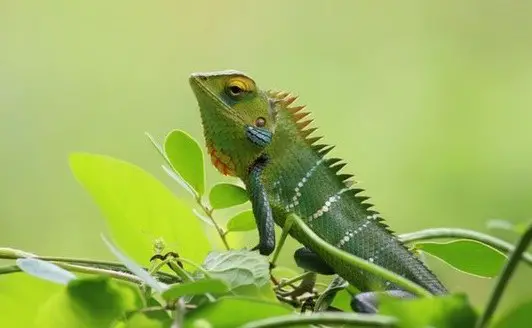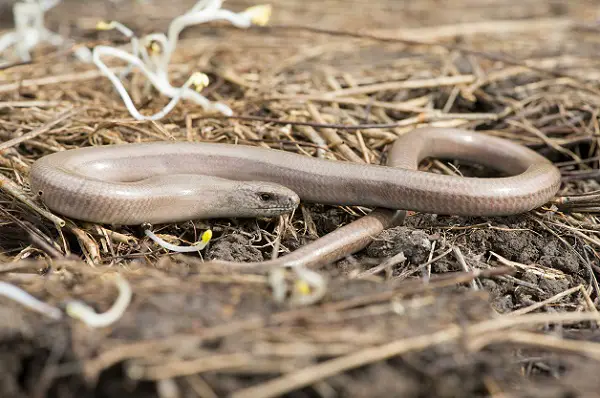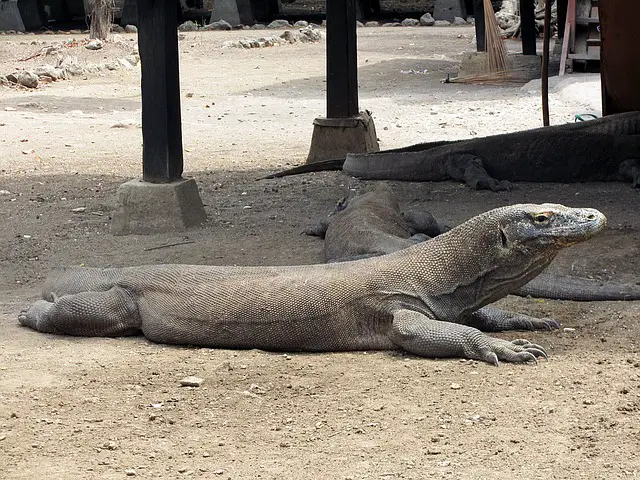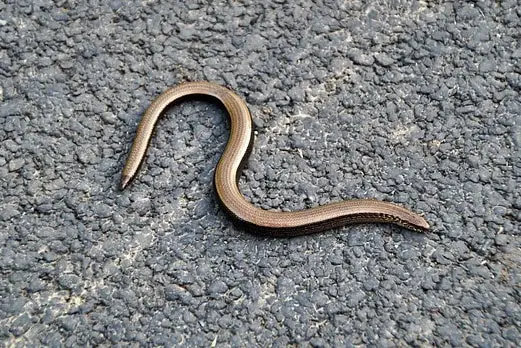Reptiles are cold-blooded vertebrate animals that move by crawling on their belly. There are nearly 9546 species of reptiles, and their list includes
- Snakes
- Crocodiles
- Alligators
- Wall Lizards (Hemidactylus)
- Chameleons (Tree lizards)
- Worm Lizards
- Blind lizard
- Slow worms.
- Tortoises
- Turtles.
- Dinosaurs
- Komodo dragons
- Marine iguana
They exist in forest lands, fresh water, and even marine waters.
Reptiles, believed to have evolved from amphibians, are primarily egg-layers. They exhibit various parenting behaviors, with some species meticulously guarding and nurturing their eggs until they hatch.
They are primarily carnivorous in nature. But some of them are even herbivores.
They have a varying life span, from a few months to even a hundred years.
They have a four-chambered heart and scaly skin with prominent teeth. See a detailed list of characteristics of reptiles.
List of Reptiles in detail
Snakes
These are animals that have a long and cylindrical body without any limbs.
There are a vast number of species of snakes. Some live in water and seas, while others are terrestrial.

They are terrifying and have poison in their salivary glands to defend themselves from enemies.
When in trouble, they bite and inject poison into the enemy’s body. This poison, in most cases, is deadly and can kill the animal or person.
Not all snakes are poisonous, and only a quarter are poisonous. Freshwater snakes are especially not venomous. In contrast, marine and oceans are deadly poisonous.
The poisonous snakes have two fangs and a pair of modified canine teeth. Hence, a poisonous snake bite shows one or two punctured wounds. In comparison, a non-poisonous snake shows many bite marks.
Interestingly, some snakes, like anacondas, are gigantic. They can swallow even large animals, including humans. Other snakes feed on frogs, rodents, birds, and other mammals.
Examples include
- Cobras,
- Anacondas (python),
- Vipers,
- Coral snakes,
- Rattlesnakes,
- Sand boa
- Rat snake
- Kraits etc.
Crocodiles and alligators
These large lizard-like reptiles live in freshwater, rivers, ponds, etc. They are carnivorous and are a few centimeters to meters in length.

They live in water and can move on land, but they tend to stay on land for a short time. They are fast swimmers and quite dangerous when in water.
They are of different types, like
- Alligators
- crocodiles
- Caiman
- Gharials
Lizards
These are typically small lizards that live in human residences, trees, bushes, and burrows. They resemble crocodiles in appearance but have tiny scales on their bodies. Their teeth are also not as prominent as crocodiles. They eat insects and other small worms.

Their specialty is their ability to cling to the walls and other erect surfaces.
The legs have suction pads by which they can adhere to erect and smooth surfaces without falling.
Also, their tails act as an organ of safety. They wag their tail at the appearance of any threat. When the predator holds the tail first, they detach from the tail and escape away.
The detached tail moves to keep the predator focused on it, and the lizard escapes. The lizards can grow their tail later.
Chameleons
These are also called tree lizards. They have more distinctive colors than other reptiles. They also can change colors and match them with the environment.

A tree lizard can look like a part of a tree and is very hard to identify. Doing so is for their safety and to evade their enemies.
Worm Lizards
These are limbless, subterranean reptiles with an elongated body of 10-70 cm.
Their body is covered by skin having scales arranged like annuli (rings).
Their head is shaped like a shovel and is hard enough to burrow through the soil. Their eyes and ears are small and covered with scales.
They are carnivorous animals and feed on invertebrates like insects.
Some of these species have forelimbs and are also viviparous.
Slow worms

These are also legless lizards found in the Eurasian region.
They move slowly and can be found underneath objects.
They feed on slow-moving worms and mollusks. Their eyes are small but functional.
Blind lizards
These are classes of reptiles similar to worm lizards but are blind. They have vestigial eyes covered by scales.
These lizards have an elongated body without limbs. But males have rudimentary hind limbs to help in coupling.
They feed on arthropods and earthworms.
Monitor Lizards

These are large lizards that live on land or trees. They eat eggs, fish, birds etc.
Their tails are long and strong, and they can use them to whip to defend themselves.
Komodo dragons

These are large lizards and have thick skin. Their distribution is restricted to a few countries like Indonesia.
Their bite can be fatal, and they have strong teeth. Unlike lizards, they attack and eat birds and large animals like deer, buffalo, goats, and other mammals.
They are good hunters and carnivorous in nature. Their venom is thought to prevent blood clots and cause hypotension and even unconsciousness when bitten by them.
They grow up to a few meters long and are very active in the movement.
Tortoises and Turtles

These reptiles have a strong shell or cover or case on their dorsal surface, which protects them from predators.
Tortoises live on land, while turtles live in water.
These animals have the longest life span and are recorded to have lived for 200 years. They are egg-laying animals and hatch on land.
They are shy animals and herbivores.
Tortoises eat vegetables, grass, flowers, weeds, etc., while turtles eat aquatic plants; they can also feed on insects, snails, and other small animals.
Marine iguana
This is a marine lizard that is found in the Galapagos Islands. This reptile feeds on different kinds of algae available in the sea. Perhaps this is a vegetarian lizard.
Dinosaurs

These are extinct reptiles thought to have lived thousands of years ago on the earth. These dinosaurs are the largest animals ever lived on the earth.
Some of them were herbivores, while others were carnivores. Few species among them are believed to have had the ability to fly.
References


this is crazy shouldn't you have more reptiles
I thought would be more reptiles. It helped a little but you should add more.
OH MY GOD THERE ARE NOT ALOT OF REPTILES
Thanks it really helped with my homework.
Kind Regards
this was helpful but you might want to put more animals